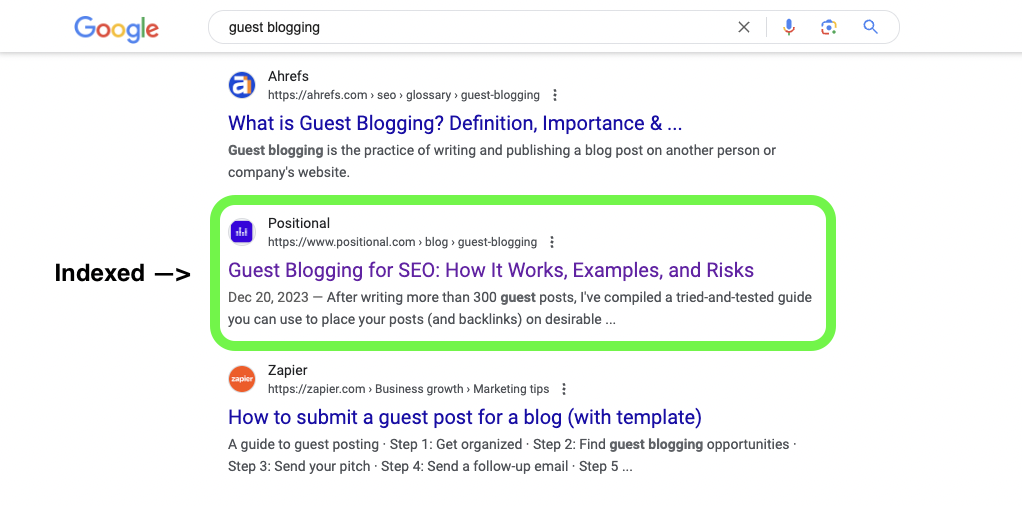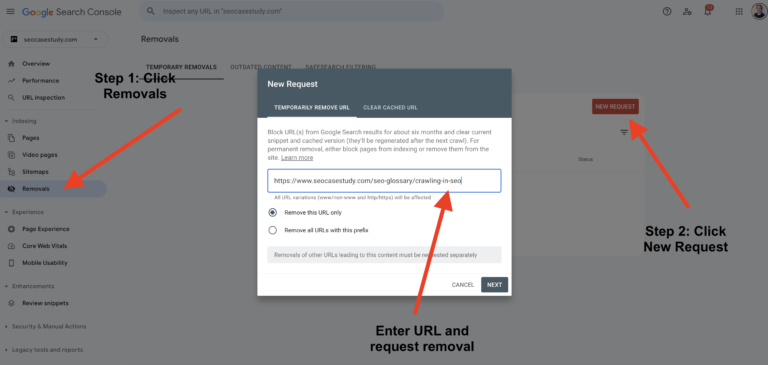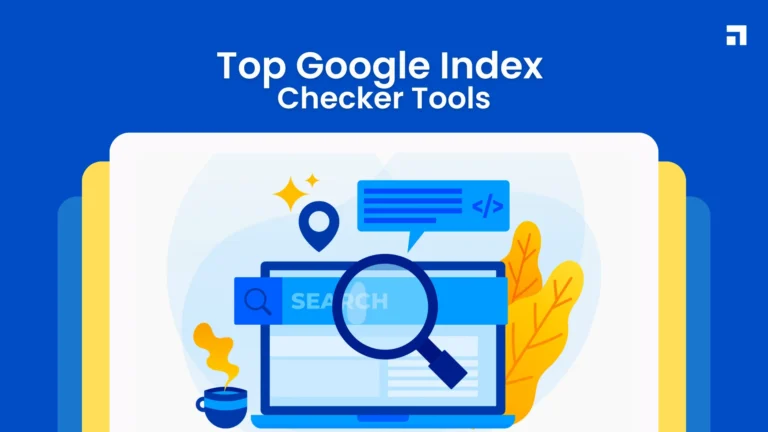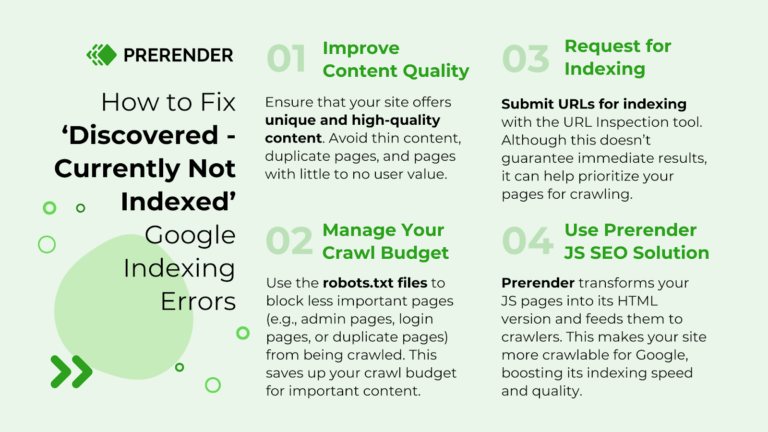HTTPS is crucial for Google indexing, as it ensures secure data transmission and boosts website rankings. Google prioritizes HTTPS sites for a safer user experience.
Using HTTPS for your website is essential for SEO and user trust. HTTPS encrypts data, protecting users from cyber threats. Google favors HTTPS sites, offering better search engine rankings. This secure protocol not only enhances user confidence but also improves site performance.
Users are more likely to engage with and trust websites that display the HTTPS padlock. Implementing HTTPS is no longer optional; it’s a fundamental aspect of modern web development. It signals to both users and search engines that your site is secure and reliable. Embrace HTTPS to stay competitive in Google’s search results.
Introduction To Https
In the digital world, security is a top priority. HTTPS is a critical part of web security. It’s essential for protecting user data. Google values it highly for indexing websites. This makes HTTPS vital for website owners.
What Is Https?
HTTPS stands for Hypertext Transfer Protocol Secure. It ensures a secure connection between the server and the browser. This protocol encrypts data during transmission. Encryption protects sensitive information from hackers. HTTPS is an upgrade of HTTP. It adds an extra layer of security using SSL/TLS protocols.
Importance Of Https
HTTPS is important for several reasons. First, it secures user data. This builds trust with your visitors. Trust is essential for online transactions. Second, Google favors HTTPS websites. This boosts your search engine ranking. A higher ranking means more traffic. Third, HTTPS protects your website from cyber attacks. This includes man-in-the-middle attacks and data breaches. Finally, browsers show a warning for non-HTTPS sites. This can deter visitors and reduce traffic.
Here are the main benefits of using HTTPS:
- Data Security: Encrypts data between the server and browser.
- User Trust: Builds confidence in your website.
- SEO Benefits: Improves Google search ranking.
- Cyber Protection: Guards against various online threats.
- Browser Warnings: Avoids “Not Secure” warnings on your site.
Implementing HTTPS is crucial for any website. It’s a simple step that offers significant benefits. Ensure your website uses HTTPS to stay ahead in the digital world.
Google’s Stance On Https
Google has a clear stance on HTTPS. It encourages all websites to use HTTPS. This ensures a secure connection between the server and the user. HTTPS protects user data from being intercepted. Google values user safety and privacy.
Google’s Announcement
In August 2014, Google made a significant announcement. It declared that HTTPS would be a ranking signal. This means HTTPS affects a website’s search engine ranking. Google wants to make the web a safer place.
The announcement prompted many websites to switch to HTTPS. It also led to an increase in SSL certificate purchases. An SSL certificate is necessary for enabling HTTPS.
Https As A Ranking Signal
Google uses HTTPS as a ranking signal. This means websites with HTTPS can rank higher. This is part of Google’s effort to encourage better security practices.
Here are some key points about HTTPS as a ranking signal:
- Improved Search Rankings: Websites with HTTPS may see better search rankings.
- User Trust: HTTPS sites are trusted more by users.
- Data Security: HTTPS protects sensitive user data from being intercepted.
Webmasters should consider switching to HTTPS. It can boost their site’s visibility and user trust.
| Benefit | Description |
|---|---|
| Search Rankings | Higher rankings in search results. |
| User Trust | Users trust HTTPS sites more. |
| Data Security | Protects user data from interception. |
Security Benefits
The importance of HTTPS for Google indexing can’t be overstated. HTTPS provides various security benefits that are crucial for both users and website owners. By ensuring a secure connection, HTTPS builds trust and improves SEO rankings. Let’s dive into the key security benefits of using HTTPS.
Data Encryption
Data encryption is one of the main benefits of HTTPS. It ensures that data transferred between the user and the website is encrypted. This means that even if someone intercepts the data, they can’t read it.
With HTTPS, sensitive information such as passwords, credit card numbers, and personal details remain secure. This not only protects users but also helps in gaining their trust.
Protection Against Cyber Attacks
Another major advantage of HTTPS is the protection against cyber attacks. HTTPS helps in defending against various types of attacks, including man-in-the-middle attacks and phishing.
Man-in-the-middle attacks occur when an attacker intercepts the communication between the user and the website. HTTPS prevents these attacks by ensuring that the data is encrypted and cannot be tampered with.
Phishing attacks involve tricking users into providing sensitive information. Websites with HTTPS are less likely to be targeted by phishing attempts, as users are more likely to trust sites that are secure.
| Benefits | Description |
|---|---|
| Data Encryption | Secures data transfer and protects sensitive information. |
| Protection Against Cyber Attacks | Defends against man-in-the-middle attacks and phishing. |
By implementing HTTPS, websites can significantly enhance their security. This not only helps in protecting user data but also improves SEO rankings. Google prioritizes secure websites in its indexing process, making HTTPS a must-have for any website owner.
Trust And Credibility
Https is a vital aspect of website security. It stands for Hyper Text Transfer Protocol Secure. This protocol ensures that any data exchanged between the user and the website is encrypted. This encryption helps protect sensitive information from hackers and cyber threats. Implementing Https can significantly enhance your website’s trust and credibility.
User Trust
Users feel safer on an Https-enabled website. They see the padlock icon in the browser’s address bar. This icon signals that their data is secure. Users are more likely to stay on your site if they feel secure. Trust is essential for retaining visitors and converting them into customers.
Impact On Bounce Rates
Having an Https-secured site can lower your bounce rates. Visitors leave non-secure sites faster. They don’t want to risk their personal information. High bounce rates can negatively affect your search engine rankings.
Https helps create a safe browsing environment. It encourages users to spend more time on your site. This increased engagement can improve your site’s SEO performance.
| Aspect | Non-Https | Https |
|---|---|---|
| User Trust | Low | High |
| Bounce Rates | High | Low |
Using Https is not just about security. It also impacts your site’s overall performance. Make sure to enable Https to boost your site’s trust and credibility.
Seo Advantages
Understanding the SEO advantages of HTTPS is crucial for website owners. Search engines like Google prioritize secure websites. HTTPS not only enhances security but also boosts SEO efforts.
Improved Rankings
Google values secure websites. HTTPS is a ranking factor. Websites with HTTPS often rank higher in search results. This means more visibility and traffic.
Google’s algorithm favors secure sites. HTTPS sites tend to have better search engine rankings. This gives you a competitive edge.
Better User Experience
HTTPS ensures data protection. Users feel safer on secure websites. This enhances their browsing experience.
Secure sites build trust. Visitors are more likely to stay and engage. This reduces bounce rates and increases conversions.
Browsers mark HTTPS sites as secure. Users see a padlock icon in the address bar. This visual cue reassures them about the site’s safety.
Implementing Https
Implementing HTTPS is crucial for your website’s security and Google indexing. HTTPS encrypts data between your site and its visitors. This encryption ensures data integrity and security. Google prefers HTTPS sites, boosting your search engine rankings. Here’s how to implement HTTPS on your website.
Steps To Transition
- Purchase an SSL Certificate: You can buy SSL certificates from trusted providers.
- Install the SSL Certificate: Install the certificate on your web server.
- Update Your Website Links: Change all internal links to HTTPS.
- Redirect HTTP to HTTPS: Set up 301 redirects from HTTP to HTTPS.
- Update Google Search Console: Add the HTTPS version of your site.
- Test Your Site: Ensure all pages load securely and without errors.
Common Challenges
- Mixed Content Issues: Ensure all resources load via HTTPS. Avoid mixed content errors.
- SSL Certificate Errors: Verify your SSL certificate is correctly installed and valid.
- SEO Impact: Monitor rankings. Temporary drops may occur during the transition.
- Updating External Links: Contact external sites linking to yours. Request they update to HTTPS links.
- Site Speed: HTTPS can affect load times. Optimize your site for speed.
Switching to HTTPS enhances your site’s security and boosts search rankings. Follow these steps and address common challenges to ensure a smooth transition.
Monitoring And Maintenance
Ensuring your website uses HTTPS is critical for Google indexing. But simply implementing HTTPS is not enough. Regular monitoring and maintenance are crucial. This ensures that your website remains secure and indexed properly.
Regular Audits
Regular audits are essential to keep your HTTPS implementation intact. You should check for expired SSL certificates. Also, look out for broken links and ensure they redirect correctly. This helps maintain the integrity of your website.
Use tools like Google Search Console and SSL Labs. These tools help you identify issues quickly. Addressing these issues promptly is key to maintaining a secure site.
| Tool | Purpose |
|---|---|
| Google Search Console | Monitor indexing and security issues |
| SSL Labs | Analyze SSL certificate strength |
Fixing Mixed Content Issues
Mixed content occurs when HTTPS and HTTP resources load together. This can cause security warnings in browsers. Fixing mixed content is crucial for a fully secure site.
Identify mixed content using browser developer tools. These tools highlight insecure resources. Replace HTTP resources with HTTPS versions. This ensures all content loads securely.
- Check images, scripts, and stylesheets
- Replace HTTP URLs with HTTPS
- Use Content Security Policy (CSP) to block mixed content
Fixing these issues improves user trust and search engine rankings. It also ensures that your site remains fully secure.

Case Studies
Exploring the impact of HTTPS on Google Indexing through case studies reveals valuable insights. These real-world examples highlight the benefits and challenges of migrating to HTTPS.
Successful Migrations
Company A saw a significant boost after migrating to HTTPS. They experienced a 30% increase in organic traffic. Their bounce rate dropped by 20%. The average session duration increased by 15%.
Company B also reaped benefits. Their search rankings improved, leading to a 25% rise in traffic. User trust increased, which led to higher conversion rates.
| Company | Traffic Increase | Bounce Rate Change | Session Duration Increase |
|---|---|---|---|
| Company A | 30% | -20% | 15% |
| Company B | 25%</td | N/A | N/A |
Lessons Learned
These case studies offer important lessons:
- Plan your migration carefully.
- Monitor performance metrics closely.
- Ensure all pages redirect properly.
- Update internal links to use HTTPS.
Company A faced challenges with mixed content errors. They resolved these by updating all assets to HTTPS. This included images, scripts, and stylesheets.
Company B learned the importance of keeping their SSL certificates up to date. Expired certificates can harm user trust and search rankings.
Future Of Https
The future of HTTPS is bright and evolving. HTTPS is essential for secure web communication. Google’s focus on HTTPS has increased over time. This ensures safer internet experiences for users. Let’s explore two key aspects of HTTPS’s future.
Evolving Security Protocols
Security protocols are always changing. They adapt to new threats and challenges. HTTPS uses SSL/TLS to encrypt data. These protocols improve with each version. This makes it harder for hackers to intercept data.
Older versions of SSL/TLS have known vulnerabilities. New versions offer better protection. Websites should always use the latest protocols. This ensures the highest level of security. Google prefers sites that stay updated.
Https And Emerging Technologies
Emerging technologies rely on HTTPS for security. The Internet of Things (IoT) is a prime example. IoT devices need secure communication. HTTPS provides that security. This helps in protecting user data.
Another emerging technology is blockchain. Blockchain transactions benefit from HTTPS. It ensures the integrity and security of the data. Using HTTPS in such technologies boosts trust.
Key Benefits Of Https
- Data Encryption: Protects user data during transmission.
- Trustworthiness: Users trust sites with HTTPS.
- SEO Boost: Google ranks HTTPS sites higher.
- Compliance: Meets industry security standards.
The future of HTTPS is integral to web security. Evolving protocols and emerging technologies strengthen its importance. Websites must adopt and maintain HTTPS for better security and SEO benefits.


Frequently Asked Questions
What Is Https?
HTTPS stands for HyperText Transfer Protocol Secure. It encrypts data between a user’s browser and the website. This ensures secure data transmission.
Why Is Https Important For Seo?
Google prioritizes secure websites in search rankings. HTTPS improves trust and security. This positively impacts user experience and search engine optimization.
Does Https Affect Google Indexing?
Yes, HTTPS is a ranking factor. Websites with HTTPS are more likely to be indexed and ranked higher by Google.
How Does Https Improve Website Security?
HTTPS encrypts data, preventing interception by hackers. This ensures the confidentiality and integrity of the data transmitted.
Conclusion
Securing your site with HTTPS is crucial for better Google indexing. It enhances user trust and improves SEO rankings. Prioritize HTTPS to protect data and boost site performance. Your website’s success depends on it. Don’t delay; make the switch to HTTPS today and see the benefits.






